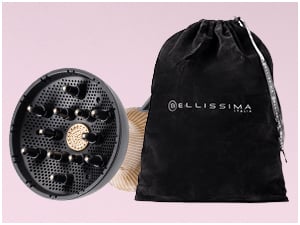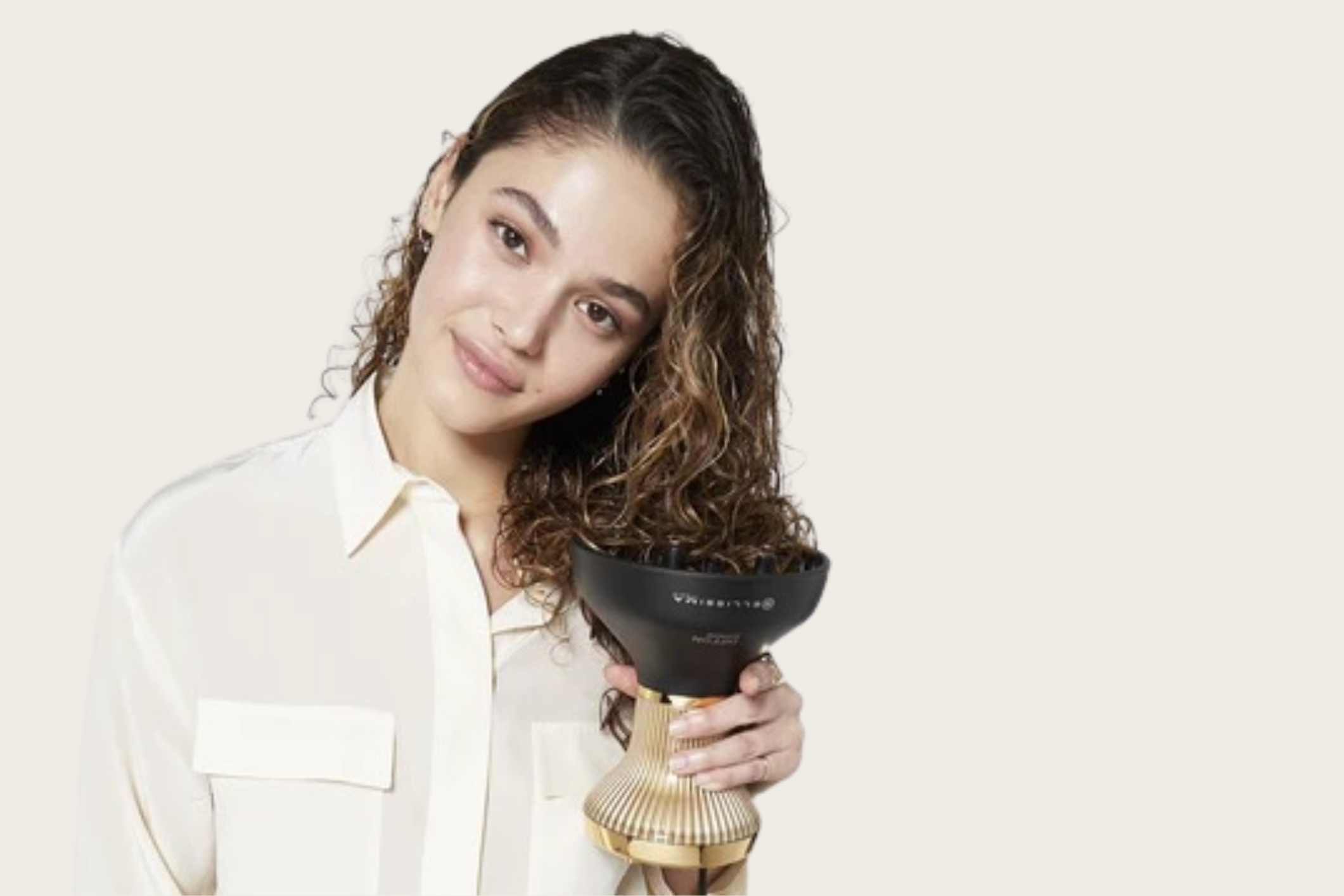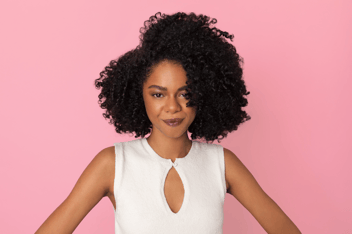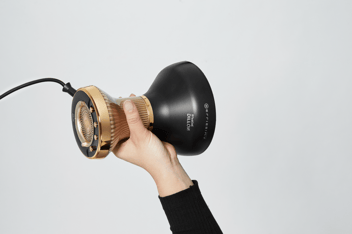 5min
5min
Wondering what does a hair diffuser do? You’ve come to the right place.
A diffuser is your secret weapon for achieving the kind of enviable, bouncy curls that lead people to say things like ‘Oh I wish I had curly hair’. Leaving your hair to dry naturally is time-consuming (plus only slightly more interesting than watching paint dry) and can also impact its health.
Using a diffuser is a gentle way to speed up the process. Read on to find out exactly what a hair diffuser does, the benefits of using one, the mistakes to avoid and a simple step-by-step to help you master the basic techniques.
What does a hair diffuser do?
A hair diffuser is either a stand-alone tool or an add-on to your hairdryer specially designed for drying curly hair. They can look quite different to your average nozzles and have a few distinctive features which work to create frizz-free waves and curls with minimal damage. They include:
-
A large surface area. Curly and wavy hair is best dried on low heat and low-speed settings to preserve its pattern and avoid frizz. By having a generous surface area, a diffuser allows you to dry bigger sections at once (so you’re not compromising on time) by placing your curls onto it;
-
A perforated grid at the base. Instead of blasting your hair in all directions, you want to control the airflow and distribute it evenly, which is why hair diffusers feature a series of smaller holes rather than one big nozzle;
-
Finger-like nodules. It can be tricky to hold a hairdryer and tease your curls into spirals at the same time, which is where the finger-like nodules on a diffuser come in handy. They help to separate and define individual curls.
Looking for a way to make your curls last longer between washes? Discover "The ultimate guide to keeping your curls looking great between washes".
The benefits of using a hair diffuser
Why would you use a hair diffuser over a regular hairdryer? Well, why wouldn’t you? Swapping to a diffuser can benefit the health of your hair and enhance your finished style. The biggest pros of a diffuser are:
-
Enhancing and defining natural curls or waves. Haphazardly rough-drying our hair and blasting the heat in all directions can flatten curls and waves – especially when airflow is directed downwards. Diffusers are designed to be kept upright, or used at a side angle, which encourages (rather than steamrollers) curls;
-
Reducing frizz. The shape of curly hair prevents the cuticles that coat our strands from slotting together neatly – allowing moisture to sneak in. Heat styling makes this worse, and the more frazzled that curly hair becomes, the more porous it will be. Hair diffusers are designed to work best at lower temperatures, helping to minimise damage and create sleek, defined spirals rather than fluffy, fuzzy ones
-
Adding volume and body to fine or limp hair. If your hair is naturally lacking in oomph, styling is your opportunity to fake it. By holding your diffuser in an upright position you’re encouraging lift and spring in your curls;
-
Minimising heat damage. Diffusers work at lower temperatures and distribute these over a wide surface area, making them gentle on the hair.
How to use a hair diffuser
Understanding how to use a hair diffuser might seem complicated at first, but it’s easier than you think. Just follow this simple step-by-step:
Step one: Prep the hair
Before you pick up the diffuser, you need to prep your hair. Comb through when it’s still wet to preserve its pattern and apply your chosen cocktail of products. Curly hair can benefit from leave-in conditioners and oils to keep it soft and silky, as well as gels, creams and mouses for hold, definition and volume.
Step two: Choose the right settings
The heat and speed settings you select on your hair diffuser will depend on the thickness of your hair and how much time you have for styling on a particular day. As a general rule, the slower the speed and the lower the temperature the better.
Step three: Divide the hair into sections
Drying your curls can feel like an overwhelming feat, so it pays to work in sections so you don’t miss any spots. You can physically divide the hair up by using soft clips, or simply work methodically from one side of your head to the other.
Step four: Choose your technique
There are different diffuser techniques, but the key to all of them is making sure you’re placing as much hair as possible onto the diffuser at a time (for efficiency) and directing the airflow upwards (to avoid straightening out your curls). To enhance this process, it's recommended to use the diffuser with your head tilted upside down or to the side. This technique ensures that the curls maintain their natural shape and bounce while allowing for optimal drying and styling.
One option is to keep the diffuser still as you style, or, you could move it in circular motions and work the fingers of the tool into the hair. If you want to add volume, use your diffuser with your head upside down to boost body from the lower layers. For hair that needs persuasion to curl and wave, you may need to keep twirling sections around your fingers to set in those spirals while drying.
Common mistakes to avoid
.jpg?width=800&height=800&name=11735_Diffon%20Argan_modella4_2000x2000%20(2).jpg)
New to your hair diffuser and not got the knack just yet? Don’t worry, practice makes perfect, and you’ll want to experiment with different techniques to find the right one for you. To help you avoid a frizz-inducing mishap, these are the most common diffuser mistakes – plus how to avoid them:
Not directing the airflow upwards
What happens when you pull a strand of your hair downwards? It gets straighter, doesn’t it? The same logic applies when drying your hair – if you direct the airflow downwards, you’re effectively setting your hair into a straighter, flatter pattern, which is the exact opposite of what we’re trying to achieve. By pointing your diffuser upwards you encourage the hair to spring into shape – like a wire coil that’s been released rather than held onto at one end.
Being impatient
Drying curly and wavy hair can take time, but don’t be tempted to blast it with heat or use your hair diffuser sporadically and at varying angles. Work slowly and methodically through the hair using your chosen technique and you’ll be rewarded with a bouncier, longer-lasting style that’ll buy you more time before your next wash.
Working from root to tip
The ends of your hair are the oldest and driest, as they’ve been exposed to more UV rays, colour and heat than the shiny new hair up by your roots. This means they’re more porous and therefore more prone to frizz. To prevent fluffy lengths, tackle them first by drying from the ends upwards.
Not using the right technique
Everyone’s curls and waves are different, so what works for one person won’t necessarily work for another. You might even find that your curl pattern varies across your head – it could be tighter on the bottom layers and looser on the top. Set aside time to practise the different techniques we covered in the step-by-step to find what works for you.
Turning up the heat too high
Curly hair is fragile, with its twists and turns making it more susceptible to snapping on the bends. The tighter your curl pattern, the higher the risk of breakage. We don’t want to make matters worse by exposing the hair to very high temperatures, as this will make it harder to style in the long run. Keep the heat settings on your hair diffuser low.
Bellissima Italia: an advanced hair diffusing tool

Bellissima Italia is home to two dedicated diffuser tools, so there’s no need to change attachments or worry about it falling off mid-styling. Their unique features include a perforated grid and 12 long fingers to gently dry and enhance the shape of your curls as well as a choice of airflow speeds depending on your hair’s needs. They’re also ergonomically designed for intuitive styling without armache. The Diffon Supreme has even more high-spec features, with a larger surface area for longer hair, digital heat control to reduce damage and ion, Argan oil and Ceramic Technology for curls that are soft, shiny and never frizzy.






